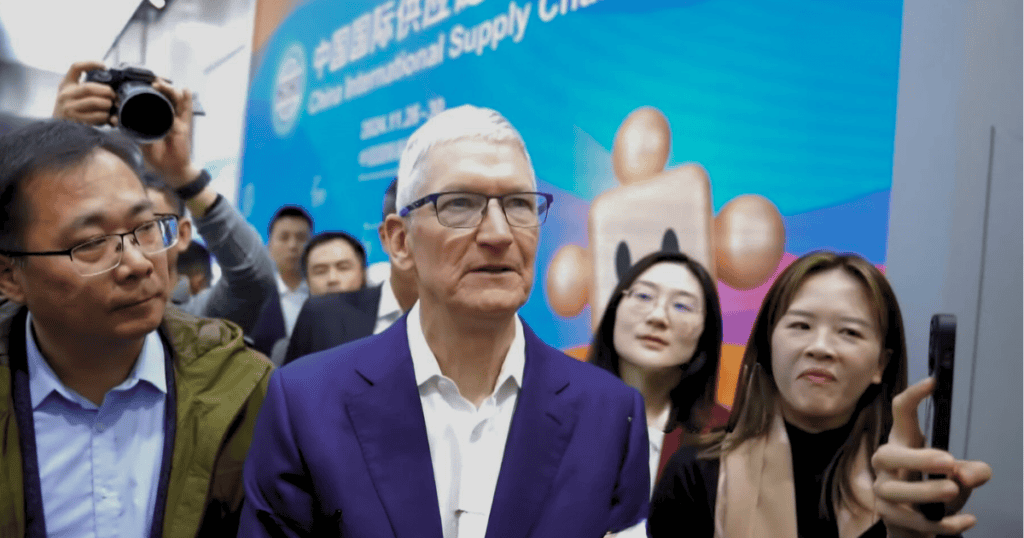Tim Cook’s recent visit to China, his third in 2023, underscores the critical importance of Chinese partnerships to Apple’s global operations and highlights the strategic maneuvers multinational corporations must undertake amidst shifting geopolitical landscapes. This visit to the China International Supply Chain Expo, alongside 20+ global business leaders from influential companies like Rio Tinto and Corning, offers a rich tableau for examining the delicate balance of international trade relations.
Strategic Partnerships at the Heart of Apple’s Success
Tim Cook’s focus during his visit was clear: reinforcing the indispensable role of Chinese partners in Apple’s ecosystem. “I value them very highly. We could not do what we do without them,” Cook stated, emphasizing the symbiotic relationship between Apple and its extensive network of Chinese suppliers. This relationship is not just a cornerstone of Apple’s success but a critical driver of innovation and efficiency within its supply chain.
China serves as Apple’s largest market outside the U.S., housing over 80% of its suppliers and producing the majority of its flagship iPhones through partners like Foxconn. This deep integration into the Chinese market is a double-edged sword, offering both unmatched production capabilities and exposure to the complexities of international politics and trade policies.
The Balancing Act: Navigating Trade Challenges
Cook’s visit comes at a time of potential upheaval, with the recent U.S. political shifts threatening to destabilize the trade dynamics. The re-election of Donald Trump has brought with it threats of increased tariffs on Chinese goods, posing a significant risk to companies deeply intertwined with Chinese manufacturing like Apple.
In response, Apple is not just passively hoping for the best but actively planning for the future. The company is diversifying its production to other regions, including Vietnam and Indonesia, aiming to mitigate risks associated with over-reliance on any single country. This strategic diversification reflects a nuanced understanding of global trade dynamics, where political changes can swiftly impact operational realities.
Cook’s Commitment to China
Despite these challenges, Cook’s visit—and his activities therein—highlight a reaffirmation of Apple’s commitment to China. His previous trips, including a notable engagement in Beijing where he underscored Apple’s investment plans in the region, illustrate a continued commitment to nurturing and expanding these critical partnerships.
The choice to participate in the China International Supply Chain Expo with local partners not only strengthens these relationships but also showcases Apple’s role as a key player in the global dialogue on trade and supply chain management. Cook’s presence at such high-profile events sends a clear message of solidarity and collaboration to both Chinese partners and the global business community.
The Implications of Cook’s China Strategy
For businesses and analysts watching these developments, several key implications emerge:
- Strategic Flexibility: Apple’s approach demonstrates the importance of strategic flexibility in global business operations. By diversifying production and strengthening international partnerships, companies can better withstand political and economic shocks.
- Geopolitical Savvy: Engaging with trade issues at this level requires a sophisticated understanding of geopolitical dynamics. Cook’s active involvement in trade discussions and his diplomatic engagements underscore the need for business leaders to be geopolitical savvy, particularly in industries dependent on global supply chains.
- Long-term Commitment: The sustained investment in Chinese partnerships, despite the looming challenges, suggests a long-term strategy that prioritizes stability and growth over short-term gains. This might serve as a model for other corporations aiming to navigate their own complex international relationships.
- Reputation Management: Apple’s visible commitment to its Chinese partners also plays a crucial role in reputation management, reassuring stakeholders of the company’s dedication to its commitments and its ability to manage risks effectively.
MacReview Verdict
Tim Cook’s third visit to China in 2023 is more than just another business trip; it is a pivotal moment in Apple’s strategic operations amidst the backdrop of global trade tensions. By doubling down on its commitment to Chinese partnerships and diversifying its supply chain, Apple not only secures its operational needs but also positions itself as a resilient and adaptable player in the global market.
As multinational corporations face increasing pressure from both political and economic fronts, the insights garnered from Apple’s maneuvers offer valuable lessons in agility, foresight, and the importance of maintaining strong international alliances. For business leaders and analysts alike, understanding these dynamics is essential for navigating the complexities of today’s globalized economy.




